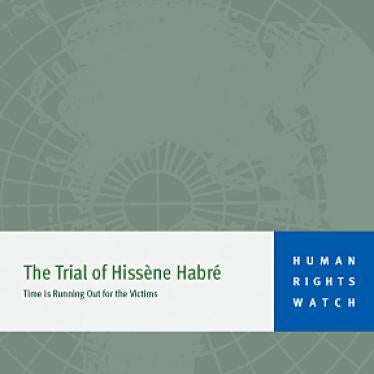On December 1, 1990, I walked out of prison and into the glaring sun of N'Djamena, Chad's capital. I was a free man but looked more like a skeleton after nearly three years in the jails of dictator Hissène Habré. I had seen hundreds of my fellow inmates die from torture, mistreatment and disease. I too had nearly died from a festering infection and survived hepatitis, dengue fever and malaria. But when Habré was overthrown as president and the prison doors swung open, at least I was alive.
Habré's brutal one-party rule lasted for eight years, before he was overthrown by the current president Idriss Déby Itno and fled to Senegal. The United States and France supported Habré, seeing him as a bulwark against Libya's Moemmar Qaddafi, but Habré turned Chad into a police state - rounding up real and suspected opponents and targeting ethnic groups when he believed that their leaders posed a threat to his regime.
While in prison, I swore that if I ever saw the light of day I would fight for justice for me and those who died in Habré's cells. And that is what I've been doing for 21 years. The road to justice has at times has seemed endless. Many of my comrades have died along the way. In hearings under way in The Hague, those of us still alive may finally begin to see a chance to reach our goal. The International Court of Justice can finally put an end to what Archbishop Desmond Tutu has referred to as "an interminable political and legal soap opera" by ordering Senegal to extradite Habré to Belgium to stand trial.
Our quest began in 2000, when I went with other survivors to seek justice in Senegal, where Habré had been living comfortably in exile for nearly a decade; enjoying the millions he allegedly stole from our treasury. The Senegalese judge who listened to our experiences indicted Habré for torture and crimes against humanity. Our hope was short-lived, however, and after political interference that was later denounced by the United Nations - Senegalese courts told us they could not try Habré.
Our lawyers then applied to a court in Belgium, where several of Habré's victims live. A Belgian judge and his team came to Chad to investigate. I took them to my old jails and they visited mass graves and spoke to survivors who lined up for hours to tell their story. The judge took the abandoned archives of Habré's feared Documentation and Security Directorate or "DDS" unearthed by Human Rights Watch. They listed 1,208 dead prisoners and 12,321 abuse victims, including me.
In 2005, the Belgian judge issued an international arrest warrant for Habré - giving us renewed hope. But Senegal refused to extradite him to Belgium. Instead, in 2006 the government agreed to an African Union request to prosecute Habré in Senegal. For the past six years, though, the Senegalese government has played games – taking one step forward only to take two steps back. First, it demanded huge sums of money to pay for the trial. When an agreement was reached with donors on a reasonable amount, the Senegalese government walked out of talks with the African Union, on setting up the trial.
Last July, Senegal's president Abdoulaye Wade said he was going to send Habré back to Chad – where he has already been condemned to death in absentia for allegedly helping the Sudanese-backed rebels who tried to overthrow Déby in 2008 - but backtracked when there was an international outcry. Chad, where many of Habré's accomplices remain in positions of power – it was their threats that forced me into exile - would be no place for his trial. And although Belgium has made four extradition requests, the Senegalese government has failed to transmit the requests properly to an extradition court. In the face of Senegal's stalling, Belgium went to the international court to force Senegal to meet its legal obligation under the UN Convention against Torture, which is to "prosecute or extradite" Habré. In papers filed with the court, Senegal contended it still intends to prosecute Habré. But president Wade and his foreign affairs minister, who used to coordinate Habré's defence team, have repeatedly said that Senegal will not try Habré. Even the Chadian government has asked that Habré be sent to Belgium for trial.
Belgium has stood by Habré's victims from the beginning and has continued to fight for justice on our behalf. If Habré is extradited to Belgium, we feel confident we will see a trial in our lifetime. As long as Habré remains in Senegal, however, where his millions have been put to good use - we believe he will continue to be shielded from justice. The Senegalese government has given the victims the run-around for 21 years and is now trying to pull the wool over the international court's eyes. The court should call a halt to Senegal's games before all the survivors of Habré's abuses die.
Souleymane Guengueng is founder of the Association of Victims of the Crimes of the Regime of Hissène Habré and lives in exile in New York. His autobiography Prisonnier de Hissène Habré has just been published






